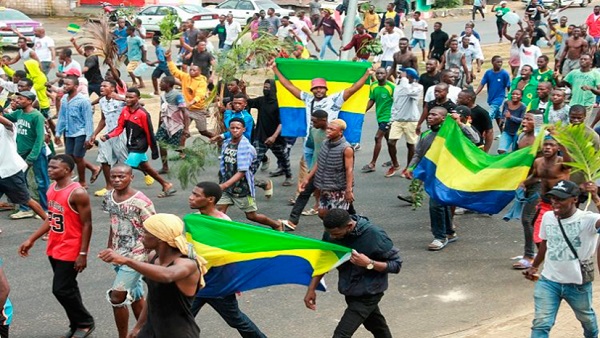
And the Gabonese danced while Democracy burned
It was a rapid sequence of events. Before the election results could be announced, the opposition cried foul and raised major concerns. In the early hours of Wednesday, August 30, the Gabonese Election Centre (CGE) declared President Ali Bongo Ondimba winner. All was set for a third term in office.
Then came the shocking news of a military takeover in Gabon. According to Reuters, the coup happened no more than an hour after the declaration of the results.
The President was placed under house arrest and the election results cancelled.
Another coup in Sub-Sahara Africa? Another “democracy” torched and left to burn? These were my immediate reactions when I woke up to the news.
Why the Gabonese dance?
As news and pictures came in from Gabon, one scene was familiar —cheering and dancing in the streets by the people of Gabon ostensibly celebrating the coup. But why will the Gabonese dance, especially when one examines their attitudes towards democracy and democratic norms as expressed in the most recent round (2023) of the Afrobarometer survey?
For example, why will a people (71%), who said democracy is preferable to any other form of government dance while democracy burned? Or why will the same people (70%) who said they strongly disapprove or disapprove of military rule dance while democracy burned? Or why will the same people (67%) who say leaders must be chosen through elections dance while democracy, which enables leaders to be chosen through elections burned? The way I see it, people who strongly prefer democracy, feel it is better to choose leaders through elections and disapprove of military rule do not dance when democracy burns.
Perhaps, they danced because of pent up resentment. After all, the same people expressed the following sentiments in the Afrobarometer survey.
a. Ninety-three per cent disapprove of one-party rule.
b. Ninety-five per cent disapprove of one-man rule.
c. Ninety-three per cent support constitutional limits of two terms in office.
d. Sixty-five per cent believe it is better if power sometimes changes hands in elections from one political party to another.
e. Forty-one per cent described the country as not being a democracy with another (43%) describing it as a democracy with major problems.
f. Forty-seven per cent described themselves as not at all satisfied with the way democracy is working, while another forty-three percent described themselves as not very satisfied with the way democracy is working.
When the dancing while democracy burns is over, I hope the military will be minded by the fact that the people still say they prefer democracy to any other form of government.
The problem we are facing today in the region
After the period often referred to as the third wave of democratisation, the autocrats in the region figured out that they could no longer hold on to power using the traditional methods of the gun alone. They realised they needed the ballot box. As a consequence, they never wavered in their commitment to hold regular elections. The result? Democracy on paper but not in form and character. Essentially, you have “democracies” that behave like autocratic regimes.
It comes as no surprise that in the most recent Democracy Index (2022) from the Economic Intelligence Unit countries in the region were classified as follows – one “full democracy”, six “flawed democracies”, 14 “hybrid regimes” and 23 “authoritarian regimes”.
The idea of a global recession of democracy is not that military regimes are necessarily back in power. It is democratic regimes behaving in autocratic ways while offering a semblance of democracy through such things as regular elections. And even the elections they offer leaves a lot to be desired about the process, the atmosphere in which it is held and the challenge of placing faith in the outcome.
Think about the recent elections in Gabon. According to reports, officials prevented international election observers from engaging in their usual election monitoring. In addition, internet service was cut and a nationwide curfew imposed.
The future ahead
As far back as March 4, 2018, Prof. David E Kiwuwa (International Studies, University of Nottingham) wrote the following “African autocrats are slowly being eased out. Incumbents might tinker with the rules of the game and shift goal posts but they cannot escape the inevitable: Change will come. It’s only a matter of when and how.”
Military intervention is not the answer to the democratic backsliding being experienced. The region has had its fair share of military rule with devastating consequences. However, democracy will have to reassert its legitimacy and clean itself of the autocratic tendencies being observed in the region. Democratic legitimacy will not be served on a silver platter.
It is incumbent upon our leaders to fix the current threats to democracy.
The writer is a fellow of the Ghana Centre for Democratic Development (CDD-Ghana)
